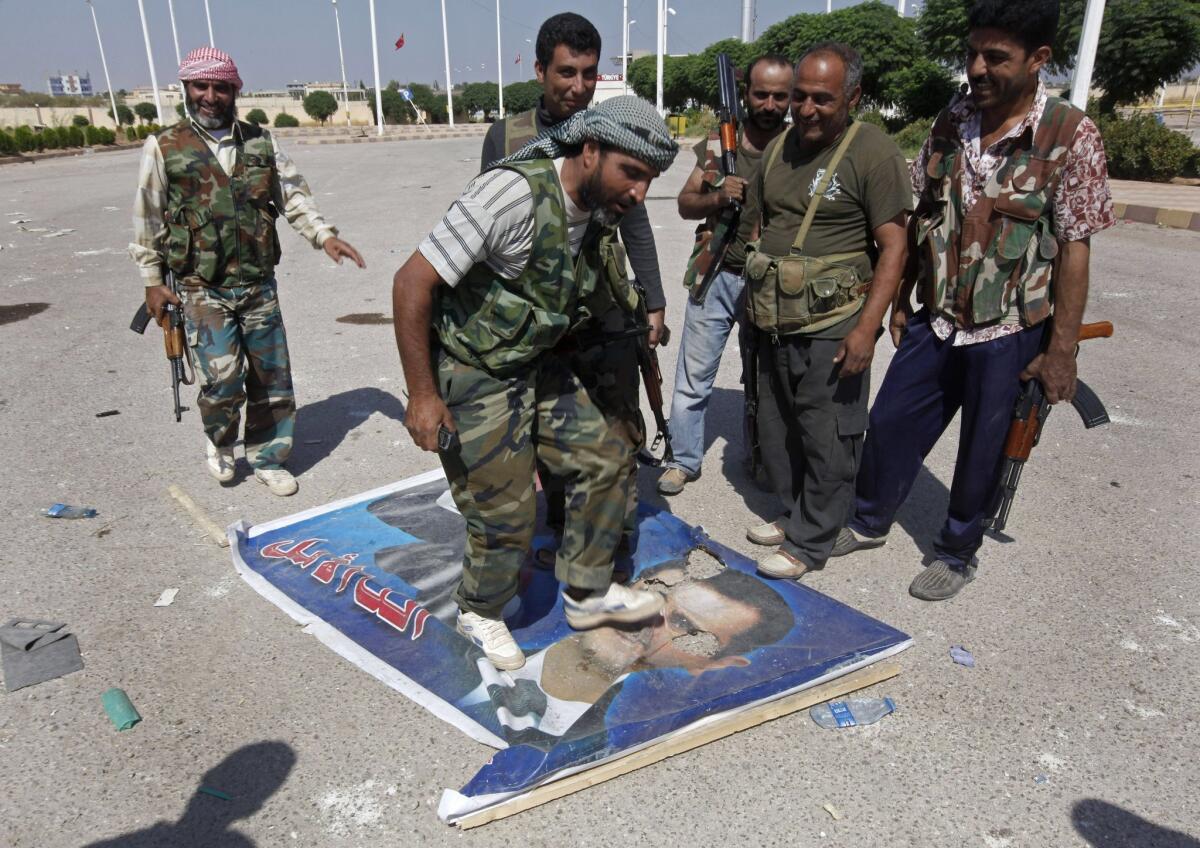Congress likely to cut failed Pentagon program to train Syrian rebels

A Free Syrian Army fighter steps on a portrait of Syrian President Bashar Assad.
- Share via
Reporting from Washington — The Obama administration’s initial effort to build a proxy military force inside Syria to help fight Islamic State appears on shaky ground as key U.S. lawmakers consider closing a $500-million Pentagon program widely considered an embarrassing failure.
Partly as a result, the Pentagon has proposed a plan to the White House that would shift the focus of future training to rebel groups already fighting in Syria, rather than try to set up a separate force from scratch.
Congress must vote to keep the current program running beyond September 2016. But lawmakers are weighing a plan to require the Defense secretary to seek approval from Congress each time he wants to spend more on the training before that date.
The program drew widespread criticism after the Pentagon acknowledged its yearlong attempt to train and deploy 5,400 rebel fighters had produced only a handful. The White House initially had touted the plan as a way to create a reliable partner in Syria and to avoid more direct U.S. involvement there.
Last year, Congress set aside $500 million for the Pentagon effort. As of May, $41.8 million had been spent. In February, the military requested an additional $600 million, bringing the total sought to $1.1 billion.
By most accounts, the Pentagon operation ran into trouble from the start.
Military trainers were told to recruit veteran Syrian guerrillas willing to fight Islamic State militants but not attack forces loyal to President Bashar Assad, whom many Syrians considered their prime enemy in the country’s multi-sided civil war.
To meet congressional guidelines, each recruit was checked for terrorist or criminal connections, a process that took weeks. Training didn’t begin until May at bases in Turkey and Jordan and never began at planned bases in Saudi Arabia and Qatar.
The first 54 recruits were mauled by Al Nusra Front, an Al Qaeda franchise, after they crossed into Syria. The second class of 71 surrendered much of their U.S.-issued ammunition and trucks to Al Nusra Front in exchange for safe passage.
Gen. Lloyd Austin, who heads U.S. Central Command, told the Senate Armed Services Committee last month that only “four or five” from the first class were still on the battlefield.
Given the setbacks, the Pentagon has put the program on hold, saying no new recruits are allowed out of the training camps. If Congress cuts the funding, the military would begin shutting the operation down.
The program has been “hugely unsuccessful,” Rep. Adam B. Schiff (D-Burbank), the top Democrat on the House Intelligence Committee, said in a telephone interview.
“It is very difficult to recruit people who don’t want to fight the [Assad] regime,” he said.
The Pentagon needs to allow its recruits to fight both Islamic State and the pro-government forces, he said.
In a letter, four senators urged Defense Secretary Ashton Carter to end the “failed” initiative.
“We ask that you cease the Syria Train and Equip Program and look for alternative ways forward,” read the letter signed by Sens. Joe Manchin III (D-W.Va.), Chris Murphy (D-Conn.), Tom Udall (D-New Mexico) and Mike Lee (R-Utah).
The lawmakers said U.S. equipment “is now aiding the very forces we aim to defeat.”
President Obama said Friday that the Pentagon program had been aimed at battling Islamic State in eastern Syria.
“I’m the first one to acknowledge it has not worked the way it was supposed to and I think that the Department of Defense would say the same thing,” Obama said at a news conference.
Obama said the administration will try to replicate some of the success Kurdish militias have had pushing Islamic State out of parts of northeastern Syria.
Christine Wormuth, undersecretary of Defense for policy, recently told a Senate committee that the Pentagon is considering deploying small numbers of U.S.-trained rebels with larger units, presumably Kurds, in northern Syria.
A separate CIA program has helped train and arm parts of the Free Syrian Army, a network of mostly former Syrian soldiers who defected from Assad’s government.
But that effort has struggled as well because its fighters want to fight Assad’s army, not just Islamic State.
Some of the CIA-backed forces were reportedly bombed in western Syria by Russian warplanes last week. Russia insisted it targeted only Islamic State, but the airstrikes hit an array of rebel and Islamist groups threatening Assad’s strongholds.
Times staff writer Lisa Mascaro contributed to this report.
Twitter: @ByBrianBennett
More to Read
Sign up for Essential California
The most important California stories and recommendations in your inbox every morning.
You may occasionally receive promotional content from the Los Angeles Times.












